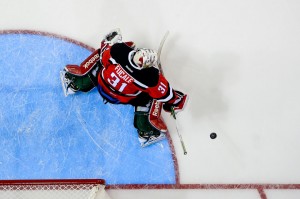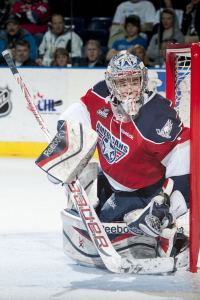
Pundits would have easily guessed before the tournament that the starting position would have been given to Fucale and it would have been his to lose to Eric Comrie. This appears to be what will happen as it was announced that Fucale was given the start in Canada’s first game on Boxing Day.
While some people have been quoted as saying that Fucale “knows how to win” – this is absurd from an analytics perspective. Fucale is not the best goalie in his league let alone one of the best Under-20 Canadian goaltenders and there are plenty of arguments for others to be on the team. But with the roster set, changes of this magnitude are unlikely to happen now. With that being said Eric Comrie has proven himself to be the much better goaltender of the two and should be the one given the starting position at the World Juniors.
The Matchup
 Analyzing goaltenders is one of the areas with the least amount of research within the analytics field. The general train of thought is that goaltenders are complete voodoo and that in short sample sizes (such as the 5-7 games of the World Juniors tournament) random variance can be all over the place. A replacement level goalie can look elite while an elite goalie can ruin his perception within this sample size. That being said analytics have developed some tools to help analyze goalies.
Analyzing goaltenders is one of the areas with the least amount of research within the analytics field. The general train of thought is that goaltenders are complete voodoo and that in short sample sizes (such as the 5-7 games of the World Juniors tournament) random variance can be all over the place. A replacement level goalie can look elite while an elite goalie can ruin his perception within this sample size. That being said analytics have developed some tools to help analyze goalies.
 We don’t use statistics such as “Wins” and Goals-Against Average. Despite their repeated citation in main-stream media these statistics are often controlled by factors outside of a goalies job. For that reason they have little value to us.
We don’t use statistics such as “Wins” and Goals-Against Average. Despite their repeated citation in main-stream media these statistics are often controlled by factors outside of a goalies job. For that reason they have little value to us.
Eric Comrie and Zachary Fucale are of the same height and similar age. Comrie is the smaller of the goalies in weight but this does not seem to affect his performance. Comrie was drafted in the 2nd round of the 2013 NHL Entry Draft to the Winnipeg Jets. He currently plays for Tri-Cities in the Western Hockey League, one of the weaker teams in the league. Drafted 15 positions head of him in the same year, Fucale currently belongs to the Montreal Canadians and plays with the Halifax Moosehead of the QMJHL, an average performing team.
Save Percentage
Save Percentage is one of the best statistics we currently have for goalies. There are some nuances within the statistic but a goaltenders main job is to stop the shots he is faced with. A goaltender who can stop a lot of shots over a long period are typically the ones who are considered elite. Even-Strength Save-Percentage is even better but we do not have this level of detail in the CHL.
Between these two goaltenders Eric Comrie has the much better raw save percentage compared to Zack Fucale by over 3%. 3% in the NHL is a huge gap, for your average starter is the difference of 46 goals which translates to about 7 wins (or 14 points in the standings).
But we cannot just look at the raw save percentage of two goalies, especially from different leagues. We know that Comrie faces more shots against a game and still is performing better. We can compare their raw save percentages to the league average and both are performing better: +0.2% for Fucale and +2.6% for Comrie; advantage Comrie.
Another way to compare the save percentage of a goalie within a distribution is to look at the z-score of the goalies. This compares how far away the goalie’s save percentage is from the league median taking into account the standard deviation. Zack Fucale appears to be nothing more than median goaltending talent in the QMJHL while Comrie is the second best goaltender in the WHL only behind Tristan Jarry.
Goals Saved Above Average
Goals Saved Above Average is a newer advanced statistic for goaltenders. Its premise is that it compares how a league average goalie would have performed in the same position as the goaltender by comparing the goals allowed. Comrie again is the leader in this statistic as he would have saved 15 more goals than a league average goalie. Fucale is the opposite in that the Halifax would have been slightly better with a league average goalie in his position. Had they played a league average goalie the Moosehead would have saved about 1 more goals.
Quality Starts
Quality Starts (QS) are one of my favourite advanced statistics and they work along side Really-Bad Starts (RBS) and Bail-Outs (BOs). A quality start looks at how often a goalie gives his team the best chance to win. In the NHL if a goaltender has performed at least league average in a game, or better than a replacement level goalie while allowing 2 goals or less, they are credited with a Quality Start. A goaltender who is not able to post a .850 in a game then they are credited with a Really-Bad Start while if a team does not have a Quality Start but the team still wins, it’s considered a bail-out. We can adjust the numbers on these statistics to reflect their respective leagues.
It’s clear to see that the Comrie has posted many more quality starts than Fucale. What does work in Fucale’s favour is that Comrie has managed to post more really bad starts while having been bailed out a few times. At best we can say that Fucale is a consistently average goalie.
Conclusion
If Canada wishes to win the World Juniors, having gone four years without a gold medal, the country should be giving their team the best chance of winning. The best chance of winning starts in net and to do that Canada should be playing the best goaltenders from the get-go. Comrie has demonstrated that he is by far the better goalie of the two within their respective leagues. Comrie is considered elite talent within the WHL while Fucale has demonstrated to be an average goalie.
These statistics don’t apply just to the small sample size of the current season. The past years have followed similar trends with Fucale being an average goaltender while Canada has passed on better goaltending talent. Hopefully this year, should Canada continue with Fucale again, they do not see similar results (again).
“How many Memorial Cup Championships have Eric Comrie won? The answer is ZERO! Fucale has won 1. How does an average goalie do that? Check all stats not just a few! Wake up!!”
Oh. My mistake.
That’s right, championships determine skill. *sigh*
Overlooking the insane comment for a minute-
Fucale plays a higher number of games per season on average over his career — which, as we all can usually agree upon, can force a goaltender’s stats to regress towards a lower career mean (based on the reasoning that with more starts, even a really good goaltender is given a larger number of opportunities to hit his ‘off season’ or have a larger number of ‘unlucky games’).
Of course, this could mean that he’s had more games to be lucky in and he’s actually a really below-average goaltender, or that Comrie has had fewer games to exhibit extraordinarily good plays… but for the most part, we can assume that Comrie would regress a bit with multiple 50+ game seasons, while Fucale’s numbers would probably look a little better than they do now if he had FEWER 50+ game seasons. This is supported by the higher number of ‘bad starts’ and ‘bail-outs’ Comrie has posted – we can assume that he’s simply gotten lucky more often than not, and hasn’t amassed a large enough sample size to see his numbers dip. Case in point would be Ben Scrivens, who has seen a dropoff in production with an increased workload, or even Darcy Kuemper, who is seeing the same.
I like Comrie better based on observation alone, but I think that clearly stating he’s above-average, while assuming Fucale is at best average, is too broad for U20 goalies.
And how many times has Comrie been in net at the World Juniors and crashed out to a 4th place finish? The answer is ZERO! Fucale has done that once. BTW, an average goalie wins the memorial cup when they have a terrible save percentage (like Fucale did) and their team doesn’t give up many shots, and has a completely dominate offence. Sometimes you need to look at how a goalie wins, not that if a goalie wins. And more importantly in Fucale’s case with the World Juniors, sometimes you need to look at how a goalie loses. If Fucale was great at the juniors last year, then I could see him starting. He was just okay and that wasn’t good enough. His Memorial was also a couple years ago, last year he crashed out in the Q playoffs. And in the World Juniors. And he’s had a rough season so far. Canada looks good enough this year so he can probably just be ok and they’ll win. But in low-scoring games, I don’t have a lot of confidence in his sub .900 save percentage. Which isn’t actually an anomaly, he’s been very consistent in his junior career and in other international play to be around .900 and hope his team can put the puck in the net a lot.
How many Memorial Cup Championships have Eric Comrie won? The answer is ZERO! Fucale has won 1. How does an average goalie do that? Check all stats not just a few! Wake up!!
You are smart. You must be a scout.
#ChrisOsgood